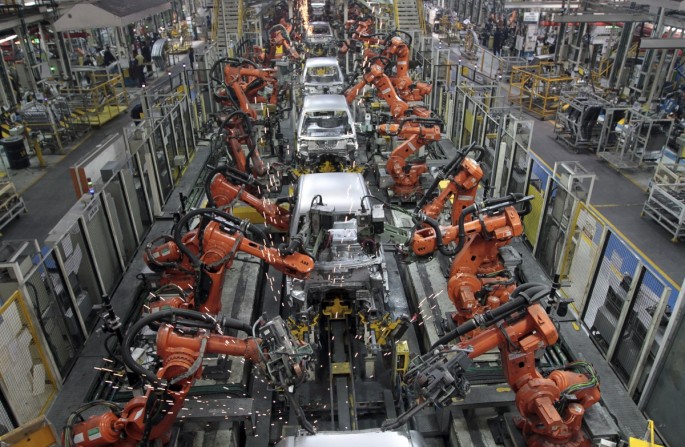Robotic arms are set to replace their human counterparts at the Everwin Precision Technology Co., which will become the first factory in Guangdong Province to be fully automated under a new "replace human workers with robot workers" policy.
Everwin, which is located at the manufacturing hub of Dongguan, has purchased 1,000 new robots, joining 100 units that are already operating in the assembly line, the Global Times reported on Tuesday.
"A robotic production line does not mean there is no human labor at all, but it will reduce by about 90 percent the number of the workers," said Chen Qixing, the chairman of the company.
"After the factory is fully equipped, it still needs about 200 staff to control the network, and serve as management, while in the past, we needed more than 2,000 workers to operate the entire factory," he added.
Ren Xiangsheng, a deputy general manager at Everwin, told the press that replacing human labor with robots will also improve product safety and quality.
"Dongguan is currently working very hard to promote 'replace human workers with robot workers' and our company is determined to become an intelligent robotic factory, using mechanical arms to replace human labor, and build a highly intelligent control system which is run via a network," he said.
Dongguan, along with Foshan and other cities along the Pearl River Delta, have implemented the "replace human workers with robot workers" policy in 2014 due increasing labor shortages.
According to data from China News Service, Guangdong has a shortfall of nearly 800,000 laborers for 2015, while Dongguan is lacking 100,000 workers.
To encourage the development of robotic production lines, the cities have handed out subsidies of up to 500 million yuan to robot manufacturers to install robots on assembly lines between 2014 and 2016.
As a result, huge numbers of robots are now installed on production lines across the province, Guangdong Deputy Governor Xu Shaohua said.
To date, the city has invested more than 4.2 billion yuan on the policy, according to Dongguan Economy and Information Bureau.
Aside from addressing the labor shortage, factories also see the robots as a means to remain competitive without having to increase the wages or benefits of workers.
While automating a factory does require a massive investment upfront, some enterprises can recover the cost in a few years, said Zhai Suoling, president of the Dongguan Taiwan-funded Enterprises Association.
"Compared to the cost of labor, which is increasing more than 20 percent a year, investment in robots may be more worthwhile," he added.
But despite rising demand for automated factories, China still lags on robotic technology, with most key components being imported overseas.
In response, Vice Minister of Industry and Information Technology Su Bo said the previous year that China will strive to make breakthroughs in key robotics technologies in order to remain competitive.
Also in 2014, Guangzhou officials unveiled goals of fostering a robo-manufacturing industry with an output value of over 100 billion yuan, and that 80 percent of manufacturing production in the city will be done by robots by 2020.



























